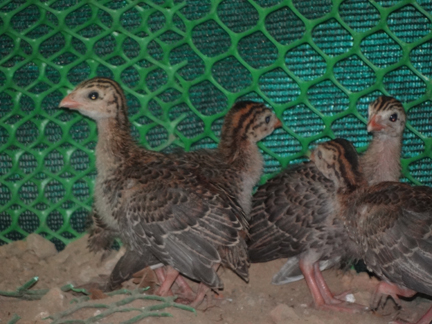Rehabilitating peachicks in Delhi
-Susan Sharma
India International Centre, a premier cultural institution of New Delhi, has the sprawling Lodi Gardens in its backyard. This citi park of 90 acres, adds to the ambiance of IIC, but has also added a new responsibility to the Centre.
The Park has a large number of peafowls, who call it their home. Lodi Park is also visited by hundreds of walkers and joggers every day who enjoy the presence of peafowls. But the problem is, it also has many feral dogs who relish peahen eggs and
even the chicks!
The ever adaptive peafowls have found a solution to this. IIC offers ledges with its numerous balconies high above the ground. Over the last few years peahens have been roosting their eggs in the ledges.
So far so good. The eggs hatch peacefully, under the protective gaze of managers, chefs, diners and attendants at IIC. When it is time for the little ones to fly, the peahen takes a big Leap of faith. She simply flies out, egging her brood to follow
suit. And follow suit they do. But while the peahen reaches the Lodi Garden environs, the chicks end up in the IIC compound. Peafowls are poor fliers and the chicks especially so.
On 25th August, I got a mail from Rahul Bist from IIC, which read
"It is to bring to your kind attention that Peahens have been laying eggs within the premises of IIC Annexe since 2007. As they don't find the grounds of Lodi gardens safe due to the human intrusion in their natural habitat and also due to the increase
in the number of pets (Dogs: both stray and adopted) that comes to the park. But guess they have found our office premises more safe for laying eggs. Last month a peahen laid 5 eggs at one of our hedge some 35-40 ft above ground level and luckily all of the
eggs got hatched. Now as they are growing day by day they try to fly and fall down and there are very high chances of them being eaten by cats or being picked by eagles and crows. Twice we have been successful in saving them. Currently we have kept them in
an enclosure with some food and water and also as the mother peahen doesn't stay with them all the time, i request you to help us in providing them a more suitable and safe habitat which is important for their survival.
Rahul Bist
Assistant Manager
IIC (Annexe)
When I reached IIC I found that the chicks were in a bird cage, well looked after. The peahen did pay a visit to the chicks but lost interest soon after. I agreed with Rahul that we needed to have a more permanent and spacious transit cage so that the
chicks can be released to the Lodi Garden when they are , may be a month old and are able to take care of themselves.
When we met Jitendra Kaushik, assistant director horticulture division, Lodi Garden, he was helpful and asked for a large and secure cage to be built within the Lodi garden, under the watchful eyes of the gardeners.
The chicks soon found their safe home in Lodi garden. While the dogs kept away, the mongoose population in the park seemed to have got wind of the abandoned chicks(abandoned by peahen). One day while keeping the feed for the chicks, the gardener noticed
that the mongoose had dug a tunnel from outside the cage which was just about to open inside the cage! Mongoose are expert diggers and imagine the feast they were hoping to have!

Mr Kaushik had to take an emergency decision. Leaving the chicks open in the garden to face their own fate, did not seem feasible anymore, what with the feral dogs and some clever mongooses on the look out for them. He rang up the Forest Dept and
asked if he can release five peachicks in the Delhi Reserve Forest. He got permission and the peachicks are now freely roaming in The Asola Bhatti Range, where BNHS has a conservation education centre. The forest there is growing organically with birds
and wildlife occupying their natural places under the watchful eyes of CEC officials and foresters.
Delhi cares for their Peafowls and Delhiites are proud of them!
(Susan Sharma is the founder of IndianWildlifeClub.com)